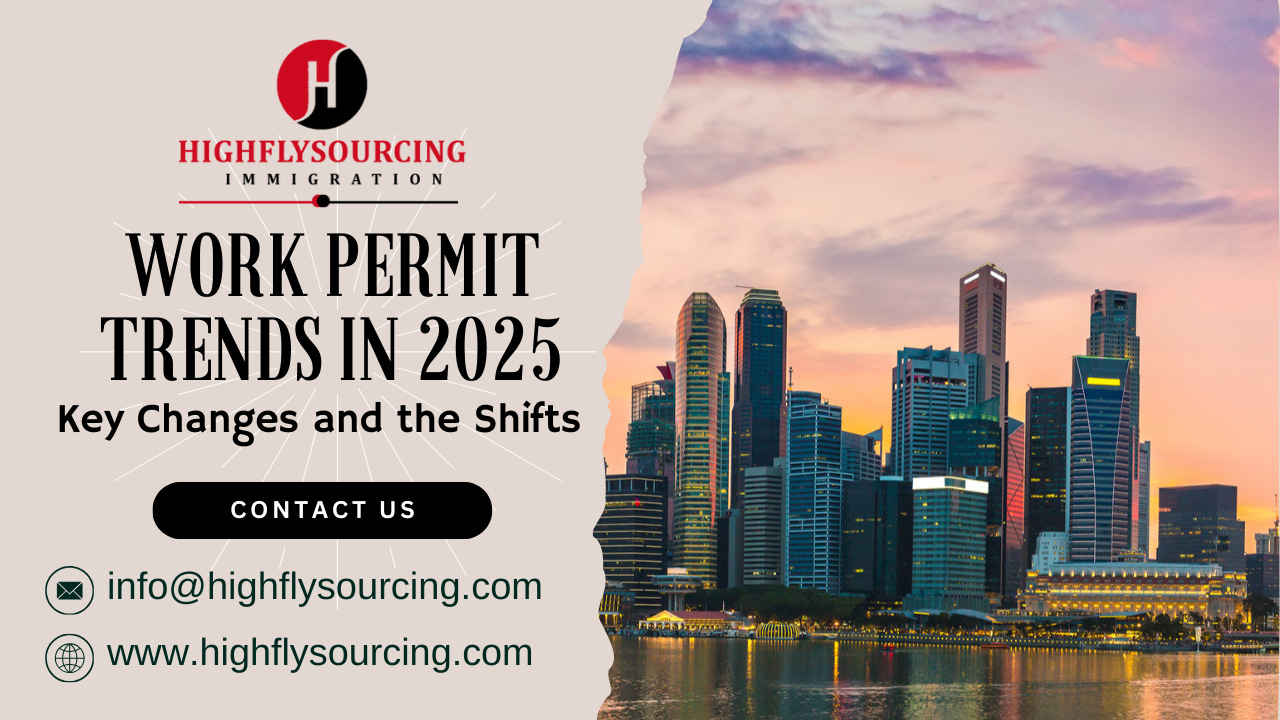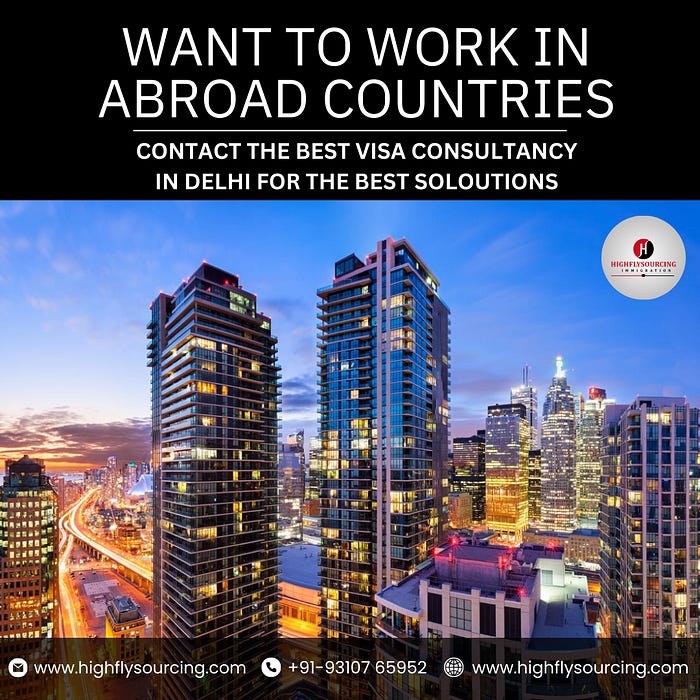
The world of work permits and immigration continues to evolve as we enter 2025. With global shifts in labor demand, technological advancements, and increasingly interconnected economies, governments are adjusting their visa policies and work permit regulations to better meet the needs of both businesses and workers. Countries are adapting to new economic realities, addressing labor shortages, and responding to the demands of an increasingly mobile workforce. These changes are set to impact employers, workers, and immigration consultants alike, requiring companies to stay informed about the latest developments in work permits and visa regulations.
In this detailed blog post, we will examine the key trends shaping work permits in 2025 and explore how visa and immigration consultancies are playing an essential role in helping individuals and businesses navigate these changes.
1. Growing Emphasis on Highly Skilled Workers
As the global economy continues to digitize and shift towards automation, skilled workers — particularly in sectors like technology, healthcare, and engineering — are becoming increasingly valuable. This demand for specialized talent is reflected in new work permit trends for 2025, where countries are adjusting their visa systems to prioritize highly skilled individuals.
For instance, several countries, such as Canada, Australia, and the UK, have been expanding their Skilled Worker programs. These programs often prioritize specific qualifications or industries with a high demand for workers, offering faster processing times and more favorable conditions for applicants.
In 2025, we expect even more emphasis on highly skilled workers, particularly in fields like artificial intelligence, cybersecurity, renewable energy, and data science. This may lead to the creation of more specialized visa categories, along with higher quotas and streamlined application processes for applicants who can meet specific industry or educational qualifications.
How Can a Visa Consultancy Help?
Visa immigration consultancies play a crucial role in assisting workers and employers in navigating these specialized work permit processes. By staying up-to-date on the latest visa requirements, consultants can help individuals prepare strong applications for high-demand fields, ensuring they meet all necessary criteria and avoid delays in processing. For businesses, a consultancy can advise on the best immigration pathways to attract skilled talent from around the world and ensure compliance with changing regulations.

2. Digital Transformation of the Immigration Process
Technology is transforming how immigration is managed, and this trend is accelerating in 2025. Many countries are embracing digital platforms to simplify the visa and work permit application process. From submitting documents online to biometric data collection and AI-powered visa assessments, the immigration process is becoming more streamlined and efficient.
In particular, the European Union has been making strides towards a more unified, digital visa system through initiatives like the European Union Digital Identity and the European Travel Information and Authorization System (ETIAS). This digitalization will allow individuals and employers to track visa applications in real-time, receive automatic updates, and complete necessary paperwork online.
The U.S. has also been exploring ways to integrate more technology into its immigration system, including using AI to speed up application processing and improve decision-making accuracy. This trend is expected to continue, with many countries modernizing their immigration infrastructure to improve both security and user experience.
How Can a Visa Consultancy Help?
Visa consultancies with digital expertise can help individuals and businesses navigate these new digital systems. Whether it’s setting up accounts on new platforms, guiding applicants through online submission portals, or ensuring that all digital requirements are met, consultancies can ensure that clients don’t encounter any technical roadblocks during the application process.
Additionally, some consultancies are embracing their own digital tools, such as automated document checkers or online case management systems, making it easier for clients to stay informed about the progress of their applications.
3. Remote Work and Cross-Border Employment
Remote work has become a permanent fixture of the global labor market, especially after the COVID-19 pandemic. In 2025, we will likely see more countries introducing visas that cater specifically to remote workers and cross-border employees. For example, digital nomad visas, which allow workers to live in a country while being employed remotely for a company located elsewhere, have been gaining traction.
Countries like Estonia, Portugal, and Barbados have already introduced digital nomad visas, and more nations are expected to follow suit in 2025. These visas allow professionals to live in a country temporarily while continuing to work for a foreign employer, which is particularly appealing to tech professionals, freelancers, and entrepreneurs.
For companies, employing remote workers across borders can bring cost-saving benefits, but it also requires careful compliance with local labor laws and immigration regulations. Employers need to ensure that they are following the right procedures when hiring foreign remote workers and that these workers are authorized to live and work in the country remotely.
How Can a Visa Consultancy Help?
Visa and immigration consultancies are invaluable when it comes to navigating the complexities of remote work visas. They can help individuals understand which countries offer digital nomad visas, guide businesses through the regulatory framework for employing remote workers across borders, and help both employers and employees ensure compliance with tax and labor laws.
4. Changes in Temporary and Seasonal Work Permits
In 2025, we are also likely to see more countries adapting their temporary and seasonal work permits in response to evolving labor market needs. Many industries, particularly agriculture, hospitality, and construction, rely on seasonal or short-term foreign workers. However, restrictions on immigration and labor shortages have highlighted the importance of attracting workers for temporary roles.
Countries are expected to introduce more flexible work permits that allow seasonal workers to enter the country for specific projects or seasonal labor demands. These changes may include relaxing visa restrictions for agricultural workers in regions with a high demand for labor, or creating simplified processes for industries that experience cyclical labor shortages.
How Can a Visa Consultancy Help?
For employers in industries that depend on seasonal or temporary foreign workers, a visa consultancy can offer expert advice on the best visa programs available for bringing in short-term workers. Consultancies can also help ensure that all workers are hired according to immigration laws and avoid any penalties associated with non-compliance. With the introduction of new visa categories or changes to seasonal work programs, consultancies will be able to guide businesses through the process of hiring international talent while meeting all regulatory requirements.
5. Increased Focus on Immigration Pathways for Entrepreneurs and Investors
In 2025, we may also see an expansion of immigration pathways designed to attract entrepreneurs and investors. As countries compete for foreign investment, many are introducing or expanding visa categories that cater specifically to individuals who want to establish businesses, create jobs, or contribute economically.
Investor and entrepreneur visa programs, such as the U.K.’s Innovator Visa or Canada’s Start-up Visa, are expected to see further refinement in 2025, with more countries offering favorable conditions for foreign investors who bring in capital and create jobs.
These programs often come with more relaxed requirements for entrepreneurs who can demonstrate a solid business plan and potential for economic contribution, as well as new pathways for high-net-worth individuals.
How Can a Visa Consultancy Help?
Visa immigration consultants are critical in assisting entrepreneurs and investors with navigating the complex requirements of these specialized visa categories. They can provide valuable insights into the best countries for launching a business, help clients prepare their applications, and ensure that all business and financial documentation is in order.

Conclusion
The landscape of work permits and immigration is changing rapidly in 2025. From the increasing focus on attracting highly skilled workers to the rise of remote work visas and the digitalization of immigration systems, the trends shaping the future of work permits present new opportunities and challenges for both individuals and businesses.
Visa and immigration consultancies are more essential than ever to help employers and workers navigate this complex and evolving landscape. With their expertise in immigration policies, their understanding of emerging visa trends, and their ability to ensure compliance with regulations, consultancies offer invaluable support to those looking to expand their global workforce or embark on international career opportunities. Whether it’s providing guidance on high-demand skill shortages, assisting remote workers, or simplifying the digital immigration process, a professional consultancy can be the key to unlocking success in an increasingly globalized world.
In 2025, staying ahead of work permit trends is vital for organizations and individuals alike. Partnering with a trusted immigration consultancy is one of the best ways to ensure a smooth and successful experience in this rapidly changing environment.
For more information or to schedule a consultation with Highfly Sourcing, visit their website or contact them directly on mail info@highflysourcing.com your global adventure awaits, and with the right support, you’ll be ready to embark on it with ease.
Other Links